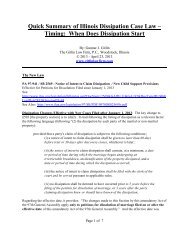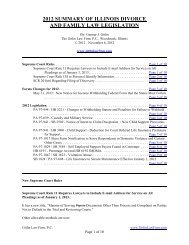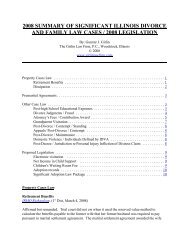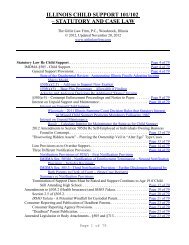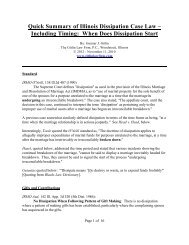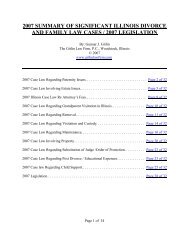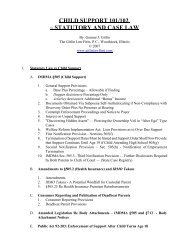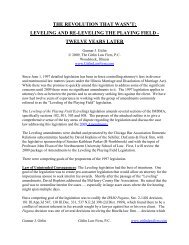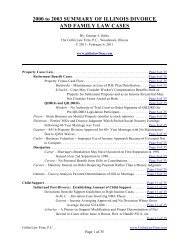Gitlin Law Firm 2008 Illinois Divorce and Paternity Case and ...
Gitlin Law Firm 2008 Illinois Divorce and Paternity Case and ...
Gitlin Law Firm 2008 Illinois Divorce and Paternity Case and ...
Create successful ePaper yourself
Turn your PDF publications into a flip-book with our unique Google optimized e-Paper software.
The ex-wife’s life insurance policy, which was a benefit of her employment, was governed by<br />
provision in the marital settlement agreement which required both parties to "maintain the<br />
children of the parties as the beneficiaries of any <strong>and</strong> all retirement plan[s], pension plans, <strong>and</strong><br />
death benefits." Therefore, after her death, the probate court correctly interpreted the marital<br />
settlement agreement when it imposed a constructive trust on proceeds of policy in favor of the<br />
guardian of parties' children, even though former husb<strong>and</strong> remained listed as the beneficiary.<br />
Carroll v. Curry - Replevin: Engagement Ring<br />
nd<br />
Caroll v. Curry, (2 Dist., June 26, 2009)<br />
Following the break-up of their romantic relationship, James Caroll brought a two count<br />
replevin action against Allison Curry. Count I sought the return of an engagement ring. The<br />
trial court granted summary judgment in favor of plaintiff <strong>and</strong> against defendant as to count I,<br />
ruling that plaintiff was entitled to possession of the ring <strong>and</strong> ordering defendant relinquish it to<br />
plaintiff. The Defendant (Allison) appealed <strong>and</strong> the appellate court affirmed.<br />
The appellate court noted that, “Replevin is a strict statutory proceeding, <strong>and</strong> the statute must be<br />
followed precisely.” Section 19--101 of the Code of Civil Procedure (the Code) provides that,<br />
"[w]henever any goods or chattels have been wrongfully distrained, or otherwise wrongfully<br />
taken or are wrongfully detained, an action for replevin may be brought for the recovery of such<br />
goods or chattels, by the owner or person entitled to their possession."<br />
The appellate court described how replevin actions operate:<br />
A plaintiff commences an action in replevin by filing a verified complaint "which<br />
describes the property to be replevied <strong>and</strong> states that the plaintiff in such action is<br />
the owner of the property so described, or that he or she is then lawfully entitled<br />
to its possession thereof, <strong>and</strong> that property is wrongfully detained by the<br />
defendant." 735 ILCS 5/19--104. The trial court then conducts a hearing to<br />
review the basis for the plaintiff's alleged claim to possession. 735 ILCS<br />
5/19--107 (West 2006). Following the hearing, an order of replevin shall issue<br />
"[i]f the Plaintiff establishes a prima facie case to a superior right of possession of<br />
the disputed property, <strong>and</strong> if the plaintiff also demonstrates to the court the<br />
probability that the plaintiff will ultimately prevail on the underlying claim to<br />
possession." 735 ILCS 5/19--107. Thus, in a replevin action, the plaintiff bears<br />
the burden to "allege <strong>and</strong> prove that he [or she] is lawfully entitled to possession<br />
of the property, that the defendant wrongfully detains the property <strong>and</strong> refuses to<br />
deliver the possession of the property to the plaintiff."<br />
The appellate court stated:<br />
[T]he pleadings, depositions, <strong>and</strong> affidavits establish that plaintiff is entitled to<br />
possess the ring as a matter of law. There is no dispute between the parties that<br />
plaintiff alone purchased the ring or that he gave the ring to defendant for the<br />
explicit purpose of proposing marriage. Thus, it is undisputed that the ring was a<br />
gift in contemplation of marriage. Gifts given in contemplation of marriage are<br />
deemed conditional on the subsequent marriage of the parties, <strong>and</strong> "the party who<br />
fails to perform on the condition of the gift has no right to property acquired<br />
The <strong>Gitlin</strong> <strong>Law</strong> <strong>Firm</strong>, P.C. Page 14 of 55 www.gitlinlawfirm.com




